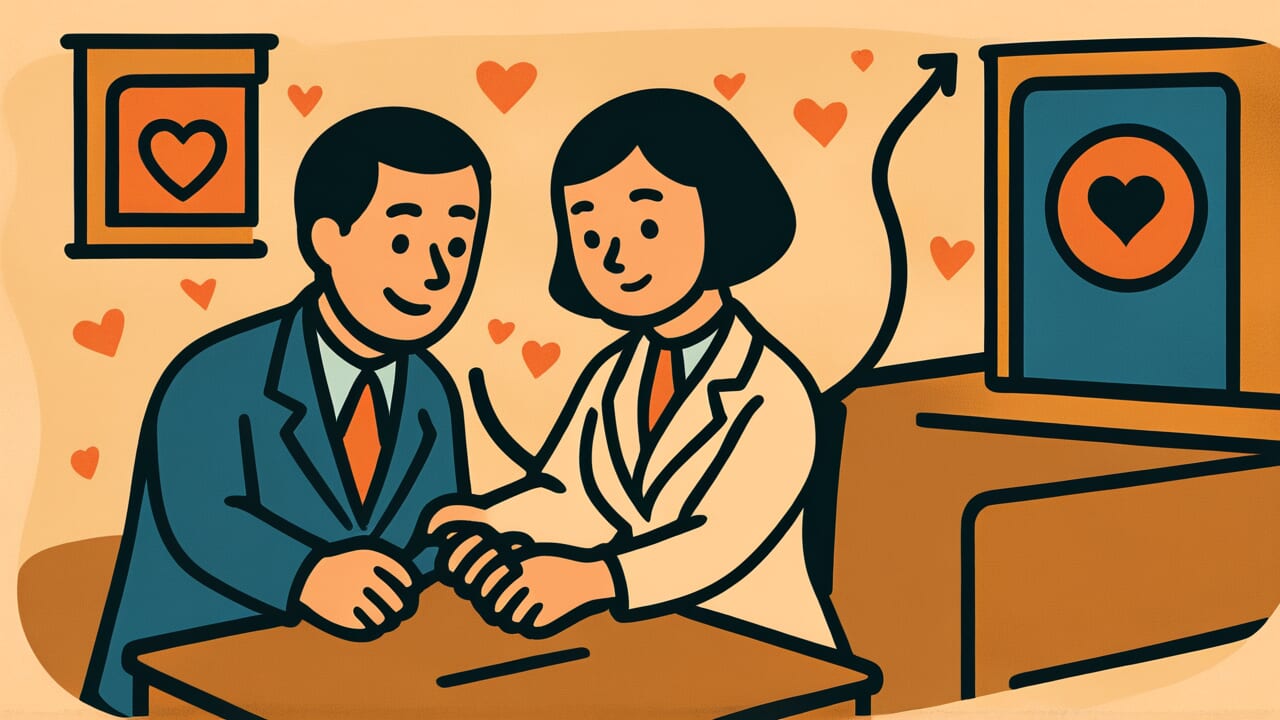How to Read “Love has no teacher”
Koi ni shishō nashi
Meaning of “Love has no teacher”
“Love has no teacher” means that there is no fixed method or correct answer in romance. No one can teach you how to love.
Even someone with rich life experience cannot fully understand your romantic partner’s heart. This is because every romantic relationship is completely different depending on who you’re with.
People use this proverb when they want advice about their love troubles. They also use it when they see someone acting like a romance expert.
The saying carries two messages. First, it accepts that “you can only learn through your own experience.” Second, it encourages you that “your own way is good enough.”
Even today, bookstores overflow with romance manuals and technique guides. But this proverb teaches us that “relying on such things is meaningless.”
Your love belongs to you alone. Someone else’s success story won’t necessarily work for you.
Origin and Etymology
The exact origin of “Love has no teacher” hasn’t been identified in historical texts. However, people likely used this proverb widely during the Edo period.
This phrase reflects Japan’s traditional master-apprentice culture. In Edo-period Japan, every skill and profession had a master teacher.
Martial arts, tea ceremony, flower arrangement, and business all required learning from a master. People considered this the natural way to master any path.
Yet in this society where “everything has a teacher,” romance was the only exception.
Why was love different? Because romance is extremely personal, and every relationship is unique.
Martial arts have set forms. Business has established principles. But love has no fixed procedures or correct answers.
You cannot see another person’s heart. A method that works for one person won’t necessarily work for another. This is why the phrase “love has no teacher” was born.
The proverb also reflects a view of human nature. Love is an instinctive emotion that cannot be reduced to logic or technique.
You cannot learn it from a teacher. You can only experience it yourself and learn through that experience. This captures the true nature of love.
Usage Examples
- I was giving my friend romance advice, but “Love has no teacher,” so in the end they have to find their own answer
- No matter how many romance books I read, nothing works – maybe that’s natural because “Love has no teacher”
Universal Wisdom
People have passed down “Love has no teacher” because it contains a truth that touches the deepest part of being human. That truth is this: the human heart can never be turned into a manual.
We learn many things through study. We memorize words, learn math, and polish our skills.
But romance is different. No matter how many books you read or how many stories you hear, you understand nothing until you experience it yourself.
Why? Because love involves a relationship with “another human being.” That person has their own emotions, thoughts, and past. This complexity cannot fit into any textbook.
This proverb shows a deep understanding of human individuality. A method that worked for Person A and Person B won’t work at all for Person C and Person D.
This should be obvious, yet we keep searching for the “right answer.” But love has no right answer. That’s exactly what makes it beautiful, painful, and precious.
Our ancestors knew this truth. They understood that the heart cannot be taught – it must be felt.
They knew that love is not a technique but a meeting of souls. That’s why this proverb has survived for hundreds of years.
When AI Hears This
In machine learning, there’s a phenomenon called “overfitting.” This happens when a model optimizes too much for training data and then fails on new data.
For example, an AI that learned from 100 successful romance cases would completely fail to predict the 101st romance. Why? Because the combination of variables in romance is astronomical.
Your partner’s personality, upbringing, mood that day, compatibility between you two, timing – these factors intertwine in complex ways.
In such situations, another person’s success pattern is only “a solution under that person’s unique conditions.”
From an information theory perspective, a teacher’s romance advice falls into the “curse of dimensionality.” There are too many factors to consider, and the sample size of another person’s experience is nowhere near enough.
Even if your teacher has 100 romance experiences, your romance is a new situation. It belongs to a “different data distribution” than those 100 cases.
Statistics proves that when you apply rules from past data in such cases, prediction accuracy drops dramatically.
What’s even more interesting is this: when you try to faithfully follow a teacher’s lessons, you lose your own natural behavior – your “regularization term.”
In machine learning, we add constraints to prevent models from becoming too complex. In romance too, the constraint of “being yourself” is the best way to prevent overfitting.
Lessons for Today
This proverb teaches modern people “the courage to trust yourself.” Social media overflows with romance techniques. Friends may offer various advice. But in the end, you are the one who lives your own love.
The fact that love has no right answer means there’s also no such thing as failure. If things don’t work out, you weren’t wrong. You simply weren’t compatible with that person.
A completely different story might await you in your next romance.
So don’t let other people’s success stories control you. Value your own feelings. If your heart says “this is the one,” you can trust that.
If your intuition whispers “something’s not right,” you can respect that too. Your own heart’s voice is a far more accurate guide than any romance manual.
Having no teacher means you yourself are the expert on your own love. Why not embrace this freedom and responsibility in a positive way?



Comments